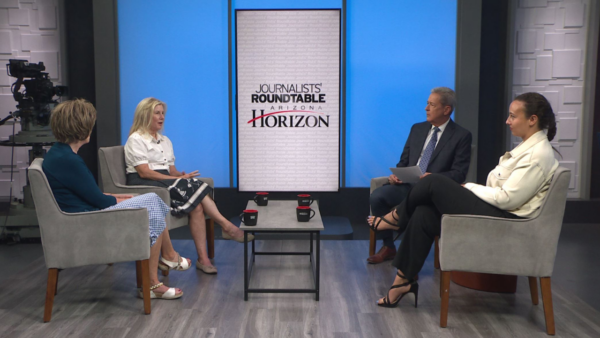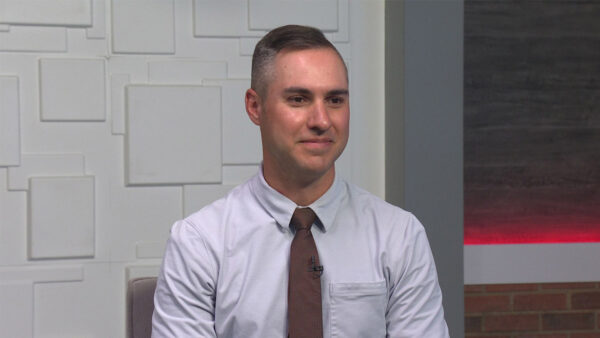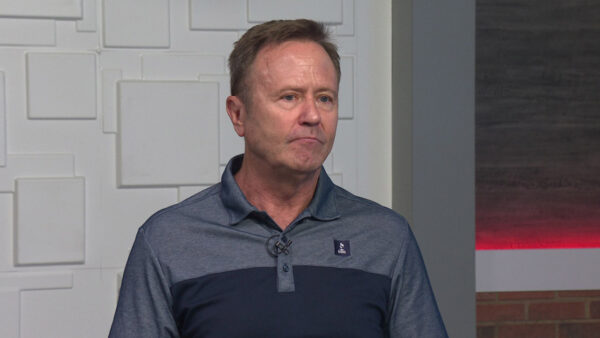In 1961, the nation’s most powerful leaders came to Phoenix to honor an Arizona senator on his 50th year in the senate. President John F. Kennedy, Vice President Lyndon Johnson and many others came to pay homage to Carl Hayden, a man instrumental in Arizona’s early development. We’ll relive the day with video and pictures recently given to the Arizona State University Libraries.
TED SIMONS: On this date in 1961, the nation's most powerful politicians gathered at the West ward HO in downtown Phoenix. The president, vice president, and more than 30 senators were there to celebrate Arizona senator Carl Hayden's 50 years in Congress. Recently the ASU libraries received original footage that was broadcast on the local station known at the time as KOOL-TV. Producer Christina Estes tells the story.
NARRATOR: Crowd of thousands here in downtown Phoenix. Shortly after 1:00. Most people are still off on their lunch hour. Many businesses in the city let the people off until the festivities of welcoming the president to Phoenix have concluded.
CHRISTINA ESTES: November 17th, 1961, was proclaimed Carl Hayden day by the mayor of Phoenix and the governor of Arizona.
NARRATOR: Band music is from the high school which is appropriately named for senator Carl Hayden.
CHRISTINA ESTES: It was also president John F. Kennedy's final visit to Phoenix. He showed up at the westward HO riding in a convertible with fellow democrat Carl Hayden. David Berman is a professor emeritus of political science at Arizona State University.
DAVID BERMAN: It seemed very informal, friendly, everybody was walking around.
NARRATOR: Here he is.
DAVID BERMAN: I went back and looked at the newspapers and they had mapped out the route he was going to be taking. It was in the newspapers. We all woke up after Kennedy's assassination, you know, at that time, probably nobody thought anything like that could happen, you know.
NARRATOR: He will be spending the night in Phoenix.
CHRISTINA ESTES: After Kennedy left the westward HO and headed to a private residence, Phoenix businessman who chaired the event introduced Hayden to the crowd.
NARRATOR: This is one of the most powerful men in the nation, indeed, in the world. But he is better known for his humility.
CHRISTINA ESTES: In 1912, just five days after gaining statehood, Carl Hayden became Arizona's first U.S. representative.
DAVID BERMAN: It was still a mining state pretty much. And which means that you had most of the population scattered around in small mining camps, Globe, Bisbee for many years, globe one of the biggest cities in the state.
CHRISTINA ESTES: Hayden moved from the house to the Senate in 1927. There he stayed more than 40 years. In total, Hayden served nearly 57 years in Congress.
NARRATOR: Here comes vice president Lyndon Johnson and Mr. Tom Chauncey
CHRISTINA ESTES: But it was the first 50 that attracted democrats and republicans to this historic event when Hayden became the first member of Congress to celebrate a golden anniversary.
NARRATOR: Now the president of the United States, ladies and gentlemen, John F. Kennedy accompanied by Arizona's senior senator Carl Hayden.
CHRISTINA ESTES: Hundreds of people paid $100 a plate to share the room with political power houses. In this White House photo, President Kennedy is speaking to the Vice President's wife Lady Bess Johnson. Just behind her is Kennedy's secretary for the interior, former Arizona congressman Stewart Udall.
DAVID BERMAN: There was something that you wanted to have people know is happening in your state. And it was a matter of pride. And I think the pride sort of was reflected in the commentators' narration of what was going on. Oh, look, there is -- oh, look there.
NARRATOR: The very great radio and television star Danny Thomas will be on hand.
DAVID BERMAN: It was really quite an interesting time in political life where the reporters are a little more laid back and there was less tension and disharmony among people who served in Congress.
CHRISTINA ESTES: But he says Carl Hayden was starting to feel some pressure.
DAVID BERMAN: He was known as the silent senator and I think he was silent, too silent and silent for too long. People didn't know who he was. And when he came in to the 50s and 60s, so many new people here that didn't know Hayden, and they didn't know much about his record.
CHRISTINA ESTES: Bergman thinks the event helped secure Hayden's re-election. The spotlight was mostly on democrats, at least one republican made it to the podium, Arizona governor Paul Fannin.
PAUL FANNIN: When Carl Hayden went to Congress, our state's population was only 204,354. Our population today is approximately 1,375,000. Over the years, legislative acumen and his great depth of understanding of problems facing the western states has contributed to the phenomenal growth that Arizona and the western states have enjoyed.
LYNDON B. JOHNSON: Senator Hayden, you will note that many of your colleagues have traveled great distances to be here. Of course, Senator Hayden, they wanted to pay tribute to you. But frankness compels me to say, senator, I think there was also another motive. They heard that Carl Hayden was going to make a speech. Someone once told me that the best way to keep the atomic bomb secret was to tell Carl Hayden.
CHRISTINA ESTES: During the dinner, Hayden explained how he came to develop his ORATORICAL approach in Congress.
CARL HAYDEN: I had been there about three months. When I first addressed the house, it was in support of an amendment to appropriate more money to fight forest fires. We had a bad fire up around Flagstaff. I chipped in my two bits worth and sat down beside Uncle Bob of Maryland, he and Steadman were the two surviving members of the Congress at that time who had served in the confederate army during the war between the states. Uncle Bob and -- well, young man, you just couldn't hold it, you just had to talk. That stenographer took down everything you said, and it will be printed in the congressional record and you can never get it out.
CHRISTINA ESTES: Hayden often described himself as a workhorse, not a show horse, something he suggested years later to a new colleague from Massachusetts.
JOHN F. KENNEDY: First contact with the senator after I had been in the Senate two months in 1953 and I got up to take part in the debate as a new member and after speaking for a few minutes, sat down next to senator Hayden and said senator, what is the difference between the senator you knew and now and the senator said new members did not speak in those days. So, I went back to my seat.
CHRISTINA ESTES: While Hayden was known as the silent senator, he wielded great power, chairing the appropriations committee and serving many years as Senate president.
DAVID BERMAN: He knew the procedures, and that is a great advantage when you are the only one that knows how to do something.
CARL HAYDEN: If I worked hard, and knew what was in every people that came out of the committees of which I was a member, in time, the members would say that man knows what he's talking about. They would have some respect for you.
DAVID BERMAN: He had no ambition other than to be a senator. He wasn't trying to run for president or anything else. And I think that sort of disarmed people who might have trouble with him. He really wasn't a threat and he could help them a great deal and he did help them. So that he was able to build those friendships across party lines very often.
CHRISTINA ESTES: Hayden played a key role in promoting the federal highway system, reportedly telling president Roosevelt Arizona had two things people would drive thousands of miles to see. The Grand Canyon and the Petrified Forest and they couldn't get there without roads.
DAVID BERMAN: He did help put Arizona on the map.
CHRISTINA ESTES: Hayden pushed a lot of bills dealing with public lands, mining, reclamation, but he often said his proudest achievement was getting Congress to approve the central Arizona project, known as the CAP. Network of canals and pumping stations deliver Colorado River water to Phoenix and Tucson.
DAVID BERMAN: '62, following that dinner, he was reelected and CAP came through after that. If he hadn't been reelected, who knows what would have happened. He had a tough fight in Congress with California and some of the other states in the Colorado river basin, and Arizona had virtually no clout at all compared to California, and he did some filibusters and senator -- another one who helped him, and they were really had a tough struggle to get that project through given our lack of might compared to what California had going for it.
JOHN F. KENNEDY: This state has benefited year after year by the constant care and attention which senator Hayden has given to the development of Arizona and the southwest. Very few sections of our country have required wider and wiser federal programs for its development than the state of Arizona, this city, Tucson and the rest.
DAVID BERMAN: I think you can make the argument that a lot of the -- the spending that he supported in Arizona and the west reclamation, dams, was not wasteful. It contributed greatly to the economy of those states.
LYNDON B. JOHNSON: I can think of no greater tribute to him than that once made by little eight-year-old Arizona school girl. She would ask in a school exam to name -- she was asked in a school exam to name the three great branches of American government. And she wrote on her paper with wisdom beyond her years, the president, the super court, and senator Carl Hayden.
TED SIMONS: The ASU libraries have made the original video available for anyone to download and view. You can find the Carl Hayden dinner at the archives web site. That's repository.ASU.EDU. That's it for now. I'm Ted Simons. Thank you so much for joining us. You have great evening.
VIDEO: "Arizona Horizon" is made possible by contributions from the friends of eight, members of your Arizona PBS station. Thank you. When you want to be more informed, eight delivers news and analysis with multiple perspectives thanks to financial support from you and --























